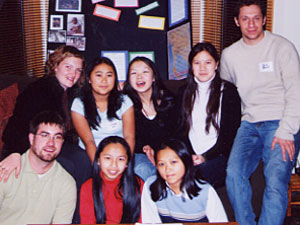|
Audio
Photos
More from MPR
Respond to this story
|
Crossing a deep cultural divide
December 20, 2002
 |
| Members of the Homeland Project (Contributed photo) |
St. Paul, Minn. — Soua Yang, 16, is the oldest of nine kids in her family. She thinks she was born in a Thai refugee camp, but doesn't know for sure.
"When my mom was fleeing to Thailand I was still in her stomach," she says. "I think she was eight or nine months pregnant and I'm not even sure where I was born, I was probably born in the forest or on their way to Thailand."
Soua lived in the refugee camp until she was 2 or 3 years old. Her parents moved to St. Paul to be with an uncle who was already here. She wants to go to Laos to see what life was like for her parents before they moved here. But she also wants to change her parents view of who she is.
"A lot of girls, they don't do a lot of things. Not that they can't, but because people think that they can't. So I guess we're trying to change that," Soua said.
The Homeland Project wasn't conceived as a girls-only venture. But in the end, no boys decided to participate. Chaperone Kate Liden says she thinks Hmong girls struggle a lot more than boys.
"It's a very patriarchal society. In their families, it's not okay to be a strong woman, you still have to stay at home and cook and clean and baby-sit and do all of the traditional Hmong women chores. But in American society they are wanting to get out there and be these strong women who can do everything. And so they really have one foot in each culture and it's really hard for them," Liden said.
The girls started talking among themselves about visiting their parents homeland more than a year ago and quickly found adults willing to go along and help them with the complicated planning process. The group first had to gain approval from five separate agencies of the Lao government. Then the INS had to approve the trip for two of the girls, who aren't US citizens.
And then there's the issue of money. The original price tag for the two-week trip was $25,000. But this week the group's travel agency, Zolotrips, went bankrupt. The girls lost all of the money they had spent on plane trips and tours within Thailand and Laos, totalling more than $9,000. The group never considered canceling the trip, but the girls will now have to do a lot more fundraising when they return.
Everyone agrees fundraising has been the hardest aspect of pulling the trip together. They have rolled thousands of egg rolls over the last year, selling them for one dollar a piece.
"I wouldn't mind never seeing another egg roll again," Liden said.
On a chilly night a few weeks ago, the fundraising was a bit more formal. Minneapolis chef Lucia Watson prepared a private dinner for about two dozen people who paid $100 for the privilege.
All five girls were relaxed and confident as they worked the crowd, talking about their families and explaining what it’s taken to pull the trip together. For thirteen-year-old Mai Zhong, it was easy talking to these strange adults but she acknowledges she's worried about what it will be like to meet her relatives in Laos and Thailand for the first time.
"If I can't help myself I might start crying or something, but I have no idea what I'm going to say," Mai said.
But even if Mai still isn't sure what words she'll use to greet her family, she is sure connecting with her relatives in Thailand and Laos, will help her connect with her parents at home.
"We're trying to fit in and do education, which is very important to our life," Mai said. "That’s what our parents say. But on the other hand they always mention needing to cook and be a good wife for the future. But I can come back and maybe I can understand them more, making it easier for them to understand me."
But Liden says the girls know the cultural gap is big, and understand that they're not going to close it with just one trip.
"They know that this is going to be a long process of trying to get the two cultures to understand each other. They know that they're not going to be able to come back and just change the world. But they DO know that they can be a start for some talk on that, and some work on that," Liden said.
For Mai, 'working on that' will start at home.
"I have a lot of sisters," Mai says. "So a lot of my sisters can be like, she was a girl and she did it so maybe I can do it too."
|
News Headlines
|
Related Subjects
|
